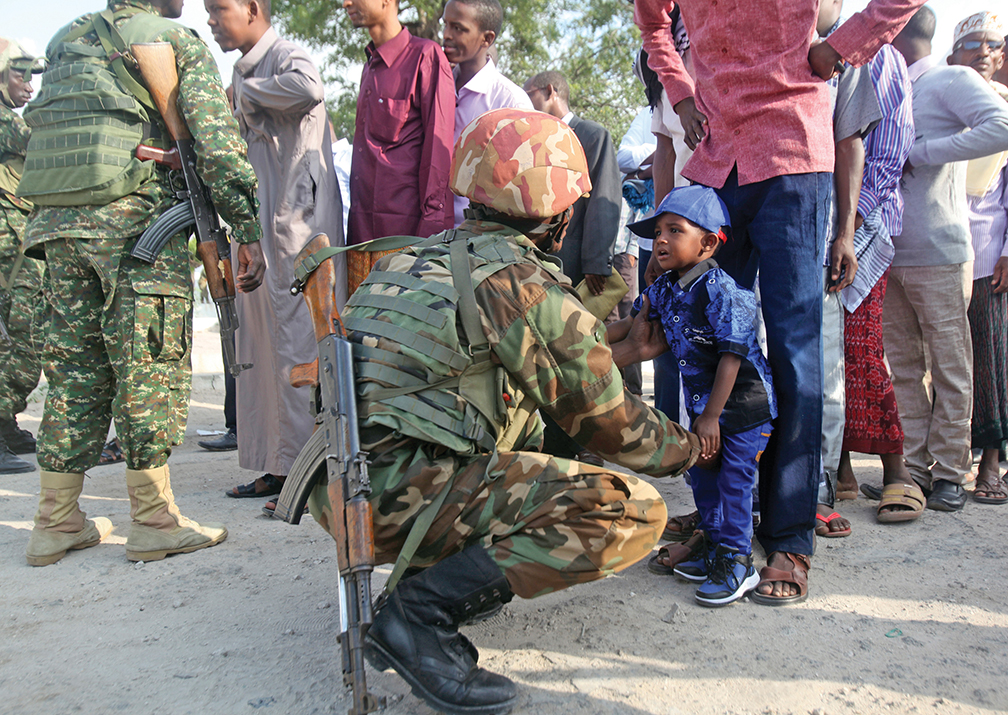African Nations Move Beyond Their Borders in Adopting Standards for Their Militaries and Police Forces
ADF STAFF
In an impressive show of unity, more than 1,000 people representing 25 African Union nations met in Yaoundé, Cameroon, in June 2013. Their goal: Stop crime in the Gulf of Guinea.
The representatives, including 13 heads of state, adopted a document called “Code of Conduct Concerning the Repression of Piracy, Armed Robbery Against Ships, and Illicit Maritime Activity in West and Central Africa.”
The document recognized codes of conduct already adopted by the Economic Community of West African States (ECOWAS), the Economic Community of Central African States, the Gulf of Guinea Commission, the United Nations, and the Maritime Organization for West and Central Africa. The code specifically addressed the nuances of pursuing ships and stopping crime outside a nation’s territorial waters.
Countries signing the code resolved to share and report relevant information, stop ships and aircraft suspected of engaging in crime, prosecute people accused of crime, and protect innocent people aboard ships in the gulf. They resolved to carry out their obligations and duties “in a manner consistent with the principles of sovereign equality and territorial integrity of States and that of non-intervention in the domestic affairs of other States.”

SPECIFIC CODES FOR SPECIFIC NEEDS
Although standards of behavior for members of the military and police are nothing new, specific codes of conduct for military institutions are a relatively recent innovation.
Codes of conduct are not laws; they are intended as ethical guidelines. They are often developed to meet special circumstances, such as sharing territories and patrol responsibilities in the Gulf of Guinea. ECOWAS developed a Code of Conduct in 1998 specifically to deal with the proliferation of illegal guns and small arms, and imposed a moratorium on buying more of these weapons. The code included such details as to how to make the public aware of the moratorium.
Other points of the ECOWAS code included development of an electronic database of registered weapons, regulation of cross-border weapons transactions, and the training of police and military personnel in regulating and administering weapons trading. The code had a provision that invited non-ECOWAS nations to participate.
ECOWAS also developed a Code of Conduct for its members’ militaries in 2006. Panapress reported that the code’s 34 principles were intended to help improve civil-military relations and civilian control of the armed forces in the region. The news agency said the code specifically defined “the regulatory framework governing civil military relations, relations between the armed forces and the security services as well as their obligations under international humanitarian law.”
The code bans the military from using force to restrict the individual and collective rights of citizens as defined by the region’s national constitutions.
The ECOWAS Defence and Security Commission adopted the draft Code of Conduct in October 2006. The ECOWAS Committee of Chiefs of Security Services adopted it in May 2009, and the ECOWAS Council of Ministers followed in August 2011.
At an October 2013 meeting, an ECOWAS official said the military Code of Conduct and other documents like it “underscore security as a subject that is not the exclusive preserve of the military and the political class, but also involves the participation of the civil society and other stakeholders as important partners in the process.”
In 2012, ECOWAS began developing another Code of Conduct to address victims of natural disasters such as flooding. Citing the increasing occurrence of such disasters due to climate change, ECOWAS designed a rights-based Code of Conduct for Humanitarian Action for civilian humanitarian actors, to “complement the Code of Conduct of Armed Forces and Security Services in West Africa.”
PROFESSIONAL STANDARDS
Some Codes of Conduct are aimed at setting uniform standards for a country, region or profession. One such code was adopted in 2001 by the 12 nations of the Southern African Regional Police Chiefs Cooperation Organisation for its police forces. Officials developed the code from a range of international and regional guidelines. Its 13 articles are now regarded as a model for establishing professional standards:
• In the performance of their duties, police will show respect for human rights.
• Police will practice nondiscrimination, with all people treated fairly and equally.
• Force may be used only when it is strictly necessary, adhering to national legislation and practices.
• No officer, under any circumstances, can inflict torture or any other cruel, inhuman or degrading punishment.
• Police will protect people in their custody, including securing medical attention when needed.
• All crime victims are treated with compassion and respect.
• Police will respect and uphold the rule of law.
• Police will behave in a trustworthy manner, avoiding any conduct that might undercut the public’s confidence.
• Officers must not abuse their power. They cannot accept bribes or favors or anything that might be interpreted as dishonest.
• Police will at all times fulfill their lawful duties responsibly and with integrity.
• Officers will be courteous at all times, with exemplary conduct.
• Matters of a confidential nature will be kept private, unless the needs of justice demand otherwise.
• In the performance of their duties, police will respect and protect all property rights.
Since the adoption of the code, some countries have published pocket-size booklets for their officers. The booklets contain the code, along with police statements of values.
Principle-based codes of conduct for militaries and police have a common thread of professionalism, integrity, respect for all human life and reverence for the rule of law. Excellence in performance is also a common theme, as is earning the respect and support of the public.
The Geneva Centre for the Democratic Control of Armed Forces says that a well-planned code of conduct has the potential to “promote peace, security, stability and the well-being of African nations.” And, the center said, a well-written code will be relevant to the particular needs of a specific country or region, “thereby helping to contribute to improved civil-military relations.”

